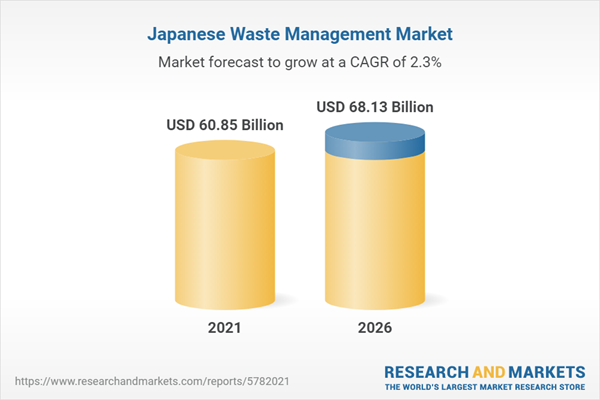Waste Management in Japan industry profile provides top-line qualitative and quantitative summary information including: market size (value and volume 2016-21, and forecast to 2026). The profile also contains descriptions of the leading players including key financial metrics and analysis of competitive pressures within the market.
Key Highlights
- The waste management industry consists of non-hazardous solid waste that include e-waste, industrial waste, municipal solid waste (MSW), and medical & biomedical waste. The market scope excludes hazardous wastes such as explosives, flammable liquids/solids or substances, oxidizing substances etc.
- The Japanese waste management industry is expected to generate total revenues of $60.9bn in 2021, representing a compound annual growth rate (CAGR) of 1.3% between 2016 and 2021.
- Industry consumption volume is forecast to increase with a CAGR of 0.6% between 2016 and 2021, to reach a total of 558,929.1 thousand tons in 2021.
- The value of the Japanese waste management industry grew by 3.2% in 2021.
Scope
- Save time carrying out entry-level research by identifying the size, growth, major segments, and leading players in the waste management market in Japan
- Use the Five Forces analysis to determine the competitive intensity and therefore attractiveness of the waste management market in Japan
- Leading company profiles reveal details of key waste management market players’ global operations and financial performance
- Add weight to presentations and pitches by understanding the future growth prospects of the Japan waste management market with five year forecasts by both value and volume
Reasons to Buy
- What was the size of the Japan waste management market by value in 2021?
- What will be the size of the Japan waste management market in 2026?
- What factors are affecting the strength of competition in the Japan waste management market?
- How has the market performed over the last five years?
- What are the main segments that make up Japan's waste management market?
Table of Contents
1 Executive Summary
2 Market Overview
3 Market Data
4 Market Segmentation
5 Market Outlook
6 Five Forces Analysis
7 Competitive Landscape
8 Company Profiles
9 Macroeconomic Indicators
10 Appendix
List of Tables
List of Figures
Companies Mentioned (Partial List)
A selection of companies mentioned in this report includes, but is not limited to:
- Daiseki Co Ltd
- Takuma Co Ltd
- Fujikoh Company., Ltd
Table Information
| Report Attribute | Details |
|---|---|
| No. of Pages | 39 |
| Published | January 2023 |
| Forecast Period | 2021 - 2026 |
| Estimated Market Value ( USD | $ 60.85 Billion |
| Forecasted Market Value ( USD | $ 68.13 Billion |
| Compound Annual Growth Rate | 2.2% |
| Regions Covered | Japan |









